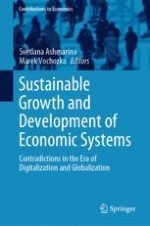2019 | OriginalPaper | Chapter
Have the Lessons About Crisis Processes in the Russian Economy Been Learned?
Author : M. A. Sherstnev
Published in: Sustainable Growth and Development of Economic Systems
Publisher: Springer International Publishing
Activate our intelligent search to find suitable subject content or patents.
Select sections of text to find matching patents with Artificial Intelligence. powered by
Select sections of text to find additional relevant content using AI-assisted search. powered by
